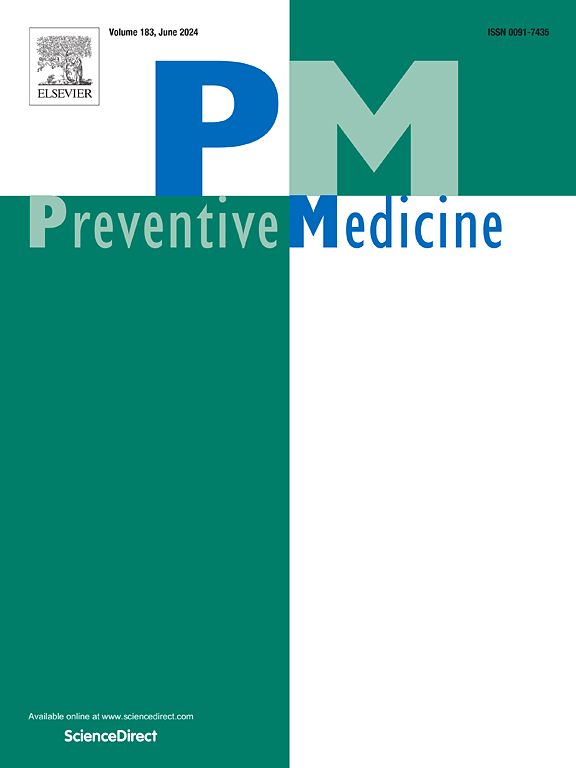评估邮寄戒烟支持的有效性:系统回顾和荟萃分析。
IF 4.3
2区 医学
Q1 MEDICINE, GENERAL & INTERNAL
引用次数: 0
摘要
目的:戒烟支持的主要障碍之一是可及性。邮寄戒烟支持有可能减轻获得戒烟支持的障碍,但其有效性尚未得到探讨。本综述旨在评估邮寄戒烟支持的有效性:方法:采用从六个数据库中检索到的研究进行了系统综述,研究时间从开始到 2024 年 5 月。采用乔安娜-布里格斯研究所的批判性评估工具对研究方法的质量进行了评估。使用随机效应模型进行元分析,以估计集合效应。异质性采用希金斯I2检验进行评估。通过漏斗图和Egger回归检验评估发表偏倚:结果:共筛选了 1918 篇引文,纳入了 12 项研究性试验。邮寄支持能明显提高戒烟六至十二个月的几率(OR = 1.43,95 % CI:1.29, 1.59)。与单纯的行为干预(OR = 1.28,95 % CI:1.11, 1.48)相比,包含尼古丁替代疗法(NRT)的干预与更高的戒烟几率相关(OR = 1.61,95 % CI:1.38, 1.87)。与持续 8 至 12 周(OR = 1.52,95 % CI 1.29,1.80)和不足 8 周(OR = 1.40,95 % CI 1.10,1.77)的干预相比,持续 12 周以上的干预戒烟几率更高(OR = 1.57,95 % CI 1.29,1.59):结论:邮寄戒烟支持可提高戒烟率,尤其是当干预措施包括非依赖性戒烟剂(NRT)且持续时间超过12周时。虽然还需要进一步的研究来完善实施策略,但邮寄戒烟支持是有效的,并有可能减少获得戒烟支持的障碍。本文章由计算机程序翻译,如有差异,请以英文原文为准。
Evaluating the effectiveness of mailout smoking cessation support: A systematic review and meta-analysis
Objective
One of the main barriers to smoking cessation support is accessibility. Mailout supports can potentially mitigate access barriers, but their effectiveness has not been explored. The aim of this review is to evaluate the effectiveness of mailout smoking cessation support.
Methods
A systematic review was conducted using studies retrieved from six databases, from inception to May 2024. The methodological qualities were assessed using the Joanna Briggs Institute Critical Appraisal tools. Meta-analysis was performed using random-effects model to estimate pooled effects. Heterogeneity was evaluated using the Higgins' I2 test. Publication bias was assessed through a funnel plot and Egger's regression test.
Results
A total of 1918 citations were screened, resulting in the inclusion of 12 RCTs. Mailout support significantly improved the odds of smoking cessation at six to twelve months (OR = 1.43, 95 % CI: 1.29, 1.59). Interventions that included nicotine replacement therapies (NRT) were associated with higher odds of smoking cessation (OR = 1.61, 95 % CI: 1.38, 1.87) compared to behavioural interventions alone (OR = 1.28, 95 % CI: 1.11, 1.48). Interventions lasting longer than 12 weeks resulted in higher odds of smoking cessation (OR = 1.57, 95 % CI 1.29, 1.59) compared to interventions lasting 8 to 12 weeks (OR = 1.52, 95 % CI 1.29, 1.80) and less than 8 weeks (OR = 1.40, 95 % CI 1.10, 1.77).
Conclusion
Mailout smoking cessation support improves quitting, especially when interventions include NRT and delivered for longer than 12 weeks. While further research is needed to refine implementation strategies, mailout smoking cessation supports are effective and have potential to reduce access barriers.
求助全文
通过发布文献求助,成功后即可免费获取论文全文。
去求助
来源期刊

Preventive medicine
医学-公共卫生、环境卫生与职业卫生
CiteScore
7.70
自引率
3.90%
发文量
0
审稿时长
42 days
期刊介绍:
Founded in 1972 by Ernst Wynder, Preventive Medicine is an international scholarly journal that provides prompt publication of original articles on the science and practice of disease prevention, health promotion, and public health policymaking. Preventive Medicine aims to reward innovation. It will favor insightful observational studies, thoughtful explorations of health data, unsuspected new angles for existing hypotheses, robust randomized controlled trials, and impartial systematic reviews. Preventive Medicine''s ultimate goal is to publish research that will have an impact on the work of practitioners of disease prevention and health promotion, as well as of related disciplines.
 求助内容:
求助内容: 应助结果提醒方式:
应助结果提醒方式:


